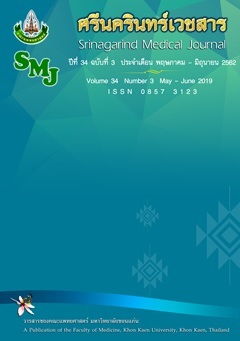Effectiveness of Health Promotion Program for Patients with Diabetes Mellitus at Baan Nongnasang Community, Roi Et Province
Keywords:
โปรแกรมส่งเสริมสุขภาพ; พฤติกรรมส่งเสริมสุขภาพ; ผู้ป่วยเบาหวาน, health promotion program; health promoting behavior; patients with diabetes mellitusAbstract
Background and Objective: The Diabetes mellitus is chronic disease and a crucial problem among patients and need specific model for caring. The purpose of this quasi–experimental research was to study effectiveness of health promotion programe for patients with Diabetes Mellitus at Baan Nongnasang community, Roi Et Province
Methods: The sample consisted of 20 diabetics. The program was applied from Pender’s health promotion model. The experimental group had health promotion program. The duration of program implementation was 12 weeks. The instruments used in this research were health promotion program based on Pender’s concept. The methods used were a visual slide display, a good model presentation, a training demonstration, a self-caring handbook, and focus group. instrument consisted of questionnaire about health promoting behaviors. It was validated with CVI of 0.82 , The Cronbach’s alpha reliability was 0.84. The collected data were analyzed by using percentage, mean, standard deviation and paired t-test.
Results: The study results were as follows : After the health promoting behavior program, the Patients DM had better health behaviors than before the health promoting behavior program with statistically significant ( t = 20.10, p<.001).The Mean of FBS was decrease after the program.
Conclusions: The program had increased positive health promoting behavior.
References
2. King H, Aubert RE , Herman W. Global burden of diabetes, September 1995- 2025: Prevalence, numerical estimates, and projections. Diabetes Care 1998; 21: 141-3.
3. Cryer PE. Hypoglycaemia: The limiting factor in the glycemic management of Type I and Type II. Diabetologia 2002; 45: 937–48.
4.ราม รังสินธุ์, ปยทัศน์ ทัศนาวิวัฒน์.การประเมินผลการดูแลผู้ป่วยโรคเบาหวานชนิดที่ 2 และความดันโลหิตสูงของโรงพยาบาลในสังกัดกระทรวงสาธารณสุขและโรงพยาบาลในสังกัดกรุงเทพมหานครประจําปี2555. รายงานวิจัยฉบับสมบูรณ์. นนทบุรี: สํานักงานหลักประกันสุขภาพแห่งชาติ; 2555.
5. Pender NJ, murdaugh CL, Parsons MA. Health promotion in nursing practice. 6 th ed USA: Pearson practice Hall; 2011.
6. จุฬาลักษณ์ บารมี. สถิติเพื่อการวิจัยทางสุขภาพและการวิเคราะห์ข้อมูลด้วยโปรแกรม SPSS .
ชลบุรี: ศรีศิลปะการพิมพ์; 2551.
7. เพ็ญศรี พงษป์ระภาพันธ์, สุวมิล แสนเวียงจันทร์, ประทีป ปัญญา. การพัฒนารูปแบบการส่งเสริมสุขภาพแบบองค์รวมของผู้ป่วยเบาหวานในชุมชนวัดปุรณาวาส. วารสารพยาบาลกระทรวงสาธารณสุข. 2555; 22 : 100-11.
8. Best John. Research in Education.New Jersey: Prentice Hall, Inc.1977;190.
9.สมจิตร์ นคราพานิช. ผลของโปรแกรม การเสริมสร้างพลังอำนาจในการส่งเสริมสุขภาพต่อ พฤติกรรมการบริโภคอาหาร พฤติกรรมการออกกาลังกาย และภาวะโภชนาการของนักเรียนชั้นมัธยมศึกษาตอนต้น. วารสารพยาบาลสาธารณสุข. 2555; 26: 32-50.
10. เทพสุดา รุ่งสาง, สุรีย์ จันทรโมลี, ประภาเพ็ญ สุวรรณ, มยุนา ศรีสุภนันท์. ประสิทธิผลโปรแกรมสร้างเสริมสุขภาพแบบมีส่วนร่วมของผู้สูงอายุ อำเภอแสวงหา จังหวัดอ่างทอง. วารสารเครือข่ายวิทยาลัยพยาบาลและกระทรวงสาธารณสุขภาคใต้. 2561; 5: 30-45.
11. เสนะ นพโสภณ. ผลของโปรแกรมส่งเสริมสุขภาพต่อพฤติกรรมส่งเสริมสุขภาพของผู้ป่วยเบาหวาน ในตำบลบางเตย อำเภอเมือง จังหวัดฉะเชิงเทรา. วารสารราชนครินทร์ 2559; 30: 161-71.
12. กรรณิการ์ เชิงยุทธ์ นงนุช โอบะ ธนกร ลักษณ์สมยา. ผลลัพธ์ของการดูแลผู้ป่วยเบาหวานชนิดที่2ของเครือข่ายหน่วยบริการปฐมภูมิโรงพยาบาลมหาวิทยาลัยนเรศวร. วารสารการพยาบาลและสุขภาพ. 2555; 6: 110-121.




